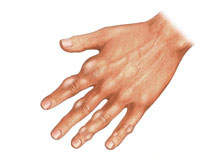Sweet soft drinks more likely to cause gout than alcohol
By Margarita Snegireva. Gout is a disease created by a buildup of uric acid. In this condition, monosodium urate or uric acid crystals are deposited on the articular cartilage of joints, tendons and surrounding tissues due to elevated concentrations of uric acid in the blood stream. This provokes an inflammatory reaction of these tissues.

For gout, sweetened soft drinks are worse than hard liquor - and nearly as bad as beer - doubling the risk for heavy drinkers. Diet sodas, however, don't affect gout risk.
The findings come from a huge study of 46,393 male health professionals in Canada who filled out detailed questionnaires about their health and their diet every four years for 12 years. Over that time, 755 of the men developed gout.
Compared with men who almost never drank sugar-sweetened soft drinks -- fewer than one per month - frequent soft-drink drinkers were significantly more likely to suffer gout:
Two or more soft drinks each day upped gout risk by 85%.
One soft drink each day upped gout risk by 45%.
Five or six soft drinks each week upped gout risk by 29%
The men who drank the most soft drinks had twice the gout risk of the men who drank the fewest soft drinks.
That's comparable to the gout risk of men who drink two to four alcoholic beverages a day.
Gout is a form of arthritis that affects mostly men between the ages of 40 and 50. The high levels of uric acid in the blood are caused by protein rich foods. Alcohol intake often causes acute attacks of gout and hereditary factors may contribute to the elevation of uric acid. Typically, persons with gout are obese, predisposed to diabetes and hypertension, and at higher risk of heart disease. Gout is more common in affluent societies due to a diet rich in proteins, fat, and alcohol. When it follows as a consequence of other health conditions such as renal failure, it is often regardless of the person's lifestyle. Lin, et al have statistical evidence linking gout to lead poisoning and lead level in the body is significantly correlated with urate excretion and gout. It is known that lead sugar was used to sweeten wine, and that chronic lead poisoning is a cause of gout, which condition is then known as saturnine gout, because of its association with alcohol and excess.
Gout also can develop as co-morbidity of other diseases, including polycythaemia, leukaemia, intake of cytotoxics, obesity, diabetes, hypertension, renal disorders, and hemolytic anemia. This form of gout is often called secondary gout. Diuretics (particularly thiazide diuretics) have traditionally been blamed for precipitating attacks of gout, but a Dutch case-control study from 2006 appears to cast doubt on this conclusion
Subscribe to Pravda.Ru Telegram channel, Facebook, RSS!


